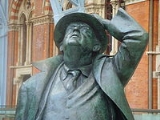
(icon; 28 August 1906 – 19 May 1984) was an English poet, writer and broadcaster who described himself in Who's Who
as a "poet and hack
".
He was a founding member of the Victorian Society and a passionate defender of Victorian architecture
. Starting his career as a journalist, he ended it as one of the most popular British Poets Laureate to date and a much-loved figure on British television.
Betjeman was born "John Betjemann"; this was changed to the less German
"Betjeman" during the First World War.
He sipped at a weak hock and seltzerAs he gazed at the London skiesThrough the Nottingham lace of the curtainsOr was it his bees-winged eyes?![]()
Gracious Lord, oh bomb the Germans.Spare their women for Thy Sake,And if that is not too easy,We will pardon Thy Mistake.But, gracious Lord, whate'er shall be,Don't let anyone bomb me.![]()
He would have liked to say goodbye,Shake hands with many friends.In Highgate now his finger-bonesStick through his finger-ends.You, God, who treat him thus and thus,Say, "Save his soul and pray."You ask me to believe You andI only see decay.![]()
Miss J. Hunter Dunn, Miss J. Hunter Dunn,Furnish'd and burnish'd by Aldershot sun,What strenuous singles we played after tea,We in the tournament — you against me!![]()
We sat in the car park till twenty to oneAnd now I'm engaged to Miss Joan Hunter Dunn. ![]()
Stony seaboard, far and foreign,Stony hills poured over space,Stony outcrop of the Burren,Stones in every fertile place![]()
No hope. And the X-ray photographs under his armConfirm the message. His wife stands timidly by.The opposite brick-built house looks lofty and calm,Its chimneys steady against the mackerel sky.![]()
And behind their frail partitionsBusiness women lie and soak,Seeing through the draughty skylightFlying clouds and railway smoke.Rest you there, poor unbelov'd ones,Lap your loneliness in heat,All too soon the tiny breakfast,Trolley-bus and windy street!![]()
In the licorice fields at PontefractMy love and I did meetAnd many a burdened licorice bushWas blooming round our feet;Red hair she had and golden skin,Her sulky lips were shaped for sin,Her sturdy legs were flannel-slack'dThe strongest legs in Pontefract.![]()
It's strange that those we miss the mostAre those we take for granted.![]()

